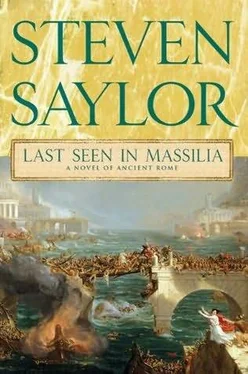Steven Saylor - Last seen in Massilia
Здесь есть возможность читать онлайн «Steven Saylor - Last seen in Massilia» весь текст электронной книги совершенно бесплатно (целиком полную версию без сокращений). В некоторых случаях можно слушать аудио, скачать через торрент в формате fb2 и присутствует краткое содержание. Жанр: Исторический детектив, на английском языке. Описание произведения, (предисловие) а так же отзывы посетителей доступны на портале библиотеки ЛибКат.
- Название:Last seen in Massilia
- Автор:
- Жанр:
- Год:неизвестен
- ISBN:нет данных
- Рейтинг книги:3 / 5. Голосов: 1
-
Избранное:Добавить в избранное
- Отзывы:
-
Ваша оценка:
- 60
- 1
- 2
- 3
- 4
- 5
Last seen in Massilia: краткое содержание, описание и аннотация
Предлагаем к чтению аннотацию, описание, краткое содержание или предисловие (зависит от того, что написал сам автор книги «Last seen in Massilia»). Если вы не нашли необходимую информацию о книге — напишите в комментариях, мы постараемся отыскать её.
Last seen in Massilia — читать онлайн бесплатно полную книгу (весь текст) целиком
Ниже представлен текст книги, разбитый по страницам. Система сохранения места последней прочитанной страницы, позволяет с удобством читать онлайн бесплатно книгу «Last seen in Massilia», без необходимости каждый раз заново искать на чём Вы остановились. Поставьте закладку, и сможете в любой момент перейти на страницу, на которой закончили чтение.
Интервал:
Закладка:
Somewhere in the darkness encircled by those moonlit walls my son had died, swallowed up in the belly of that recumbent behemoth. Or else he still lived, pursuing a fate as shadowy as the night.
I heard footsteps and sensed a presence behind me. A sentry, I thought, come to send me back to my bed; but when I turned I saw that the man wore a sleeping tunic. He was quite short and had a neatly trimmed beard.
He stepped up to a spot on the crest of the hill not far off, crossed arms, and studied the view. "Can't sleep either?" he remarked, not really looking at me.
"No."
"Neither can I. Too excited about tomorrow."
"Tomorrow?"
He turned his head, studied me for a moment, then frowned. "Do I know you?"
"I'm a visitor from Rome. Arrived earlier tonight."
"Ah. I thought you were one of Trebonius's officers. My mistake."
I studied him in return. I smiled. "But I know you."
"Do you?" He peered at me. "It's the darkness. I can't-"
"We met at Brundisium a few months ago, in circumstances not dissimilar to this. Caesar was laying siege. Pompey was trapped in the city, desperate to sail away. Caesar was building extraordinary earthworks and breakwaters at the mouth of the harbor, trying to close it off and trap Pompey's ships inside. You pointed out the structures and explained the strategy to me, Engineer Vitruvius."
He clicked his teeth, furrowed his brow, then opened his eyes wide. "Of course! You arrived with Marc Antony, just before all Hades broke loose." He nodded. "Gordianus, isn't it? Yes, I remember. And you're-you're that fellow Meto's father."
"Yes."
There was a silence, uncomfortable on my part. Together we stared at the moonlit view.
"What do you know about my son?" I finally asked.
He shrugged. "Never had occasion to meet him. As an engineer, I've always dealt with others among Caesar's officers. Know him by sight, of course. Seen him riding alongside the imperator, taking notes while Caesar dictates. That's his function, I understand, assisting Caesar with letters and memoirs."
"What else do you know about Meto? There must be rumors." He snorted. "I never listen to camp gossip. I'm an engineer and a builder. I believe in what I can see and measure. You can't build bridges by hearsay."
I nodded thoughtfully.
"Is he in camp, then-your son?" asked Vitruvius. "Come to visit him, have you, all the way from Rome? But then, you traveled all the way from Rome to Brundisium to see him there, didn't you? The gods must have given you a harder backside for traveling than I've got!"
I kept my face a blank. Vitruvius didn't know, then. The tale of Meto's betrayal was confined to those higher up or closer to Caesar's immediate circle. I took a deep breath. "Trebonius tells me there's no way into Massilia," I said, casually dropping the siege commander's name.
The engineer raised an eyebrow. "It's a well-fortified city. The walls extend all the way around, one continuous circuit along the land, along the sea, and also along the sandy beach that fronts the harbor. The walls are made of massive limestone blocks, strengthened at intervals by bastion towers. Extremely well constructed; the blocks appear to be perfectly fitted and stacked, without cement or metal clamps. The lower courses have slits for shooting arrows. The upper battlements have platforms for machine-bows and torsion artillery. This isn't like laying siege to some Gaulish fort thrown together with logs, I can tell you that! We'll never ram our way in, never bring down the wall with catapults."
"But the walls can be breached, nonetheless?"
Vitruvius smiled. "How much do you know about laying sieges, Gordianus? That son of yours must have learned a thing or two campaigning with Caesar up north and editing his memoirs."
"My son and I usually talk of other things when we meet." He nodded. "I'll tell you about sieges then. The main virtues of the besieger are patience and perseverance. If you can't crash or burn your way in, you must burrow like a termite. The sappers will have all the glory in this siege. They're the ones who dig, burrowing under the walls. Burrow far enough, and you've got a tunnel into the city. Burrow deep and wide enough, and a section of wall comes crashing down under its own weight."
"It sounds almost too simple."
"Far from it! It takes as much thoughtful engineering and hard labor to bring down a city as it does to build one. Take our situation here. Caesar chose this spot for a camp because it's high up. Not only can you see the city and the sea beyond, but you have a clear view of the siegeworks going on in the valley just below us. That's where the real action is. Right now it's too dark, the valley's all in shadow, but come dawn you'll be able to see what we've accomplished down there.
"The first step in any siege is to dig a contravallation-that's a deep trench parallel to the city walls protected by screens. That allows you to run men and equipment back and forth. Our contravallation runs all along that valley down there, from the harbor to our left, all the way over to the smaller inlet to our right, on the other side of the city. The contravallation also protects the camp from the city; prevents the enemy from pouring out of the gates and mounting a counterassault against us. At the same time, it hinders anyone beyond the camp from running fresh supplies into the city. That's important. Hunger is every man's weakness." He ticked his fingers, reciting a list. "Isolation, deprivation, desperation, starvation: no battering-ram can match the power of those.
"But to mount an assault, you need to wheel your towers and siege engines right up to the walls. If the ground isn't level-and it's certainly not level in that valley down there-you've got to make it so. That's why Caesar ordered the building of a massive embankment at a right angle to the wall, a sort of elevated causeway. It took a lot of leveling before we could lay the foundation; you'd think we were building an Egyptian pyramid from the amount of earth we've moved. The embankment is made mostly of logs, stacked up and up and up, each level perpendicular to the one below, with earth and rubble packed into the interstices to make it solid. Where it cuts across the deepest part of the valley, the embankment's eighty feet from top to bottom.
"All the time this digging and building has been going on,
the Massilians have kept firing on us from the walls, of course. Caesar's men are used to fighting Gauls, who've got nothing bigger than spears and arrows and slingshots. It's another game altogether with these Massilians. The hard fact is, though I hate to admit it, their artillery is superior to ours. Their catapults and ballistic engines shoot farther and shoot bigger. I'm talking about twelve-foot feathered javelins raining down on the men while they're trying to stack heavy logs! Our usual protections-movable shields and mantlets-were totally inadequate. We had to build lean-tos all along the embankment to protect the workers, stronger than any such structures we'd built before. That's what I love about military engineering-always a new problem to solve! We built the lean-tos from the stoutest wood we could find, armored them with pieces of timber a foot thick, and covered everything with fireproof clay. Boulders roll off like hailstones. Giant javelins bounce back as if they'd struck solid steel. Still, the racket inside those lean-tos, with missiles and stones crashing down, can certainly set your teeth on edge! I know; I spent my share of time down there overseeing the work.
"Once the embankment was almost done, we set about building a siege tower mounted on rollers, with a battering-ram built into the lower platform. It's down there now, at this end of the embankment. Tomorrow it will sally forth across the causeway, and there's no way the Massilians will be able to stop it. The men on the upper platforms of the siege tower are protected by screens of hempen mats too thick for any missile to penetrate. Once the tower is flush against the wall, the men on the upper platforms can fire down on any Massilians who venture out of the city to try to stop the operation, while the men on the lower platform can swing the battering-ram at will. Do you know what sort of panic that causes in a besieged city-the boom, boom, boom of a battering-ram striking the walls? You'll be able to hear it for miles."
Читать дальшеИнтервал:
Закладка:
Похожие книги на «Last seen in Massilia»
Представляем Вашему вниманию похожие книги на «Last seen in Massilia» списком для выбора. Мы отобрали схожую по названию и смыслу литературу в надежде предоставить читателям больше вариантов отыскать новые, интересные, ещё непрочитанные произведения.
Обсуждение, отзывы о книге «Last seen in Massilia» и просто собственные мнения читателей. Оставьте ваши комментарии, напишите, что Вы думаете о произведении, его смысле или главных героях. Укажите что конкретно понравилось, а что нет, и почему Вы так считаете.










